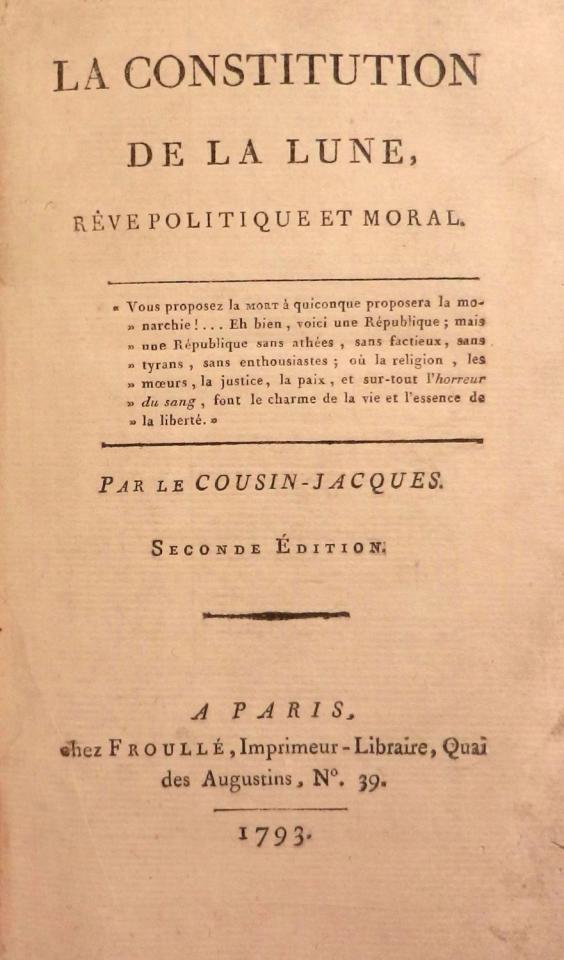#release themselves (as The Brothers). Cousins must have liked it‚ because the song was quickly reworked to incorporate him and squeezed
Explore tagged Tumblr posts
Photo

La Constitution de la Lune (Le Cousin Jacques)
Recently, when doing research on the Constitution of 1793, I stumbled upon this interesting work: La Constitution de la Lune, rêve politique et moral by Louis Abel Beffroy de Reigny, also known as “Le Cousin-Jacques”. The title made me curious, so I did some research on the work and its author.
Beffroy was a dramatist and writer during the French Revolution. He was born in Laon on 6 November 1757 and came to Paris in 1770 in order to attend the Collège Louis-le-Grand, where Robespierre, Fréron and Camille Desmoulins also studied. His pseudonym, “Cousin Jacques”, must have emerged at that time ; according to some sources, it was given to him by young women when gambling. After having served as a professor in several cities in the province, he married in 1780 and abandoned teaching in order to become a journalist, poet and dramatist. In 1783, he was imprisoned in the Bastille for having published Les Petites Maisons du Parnasse. [1]
Between 1785 and 1791, he released a monthly journal, alternately going by the names Les Lunes du Cousin Jacques, Le Courrier des planètes and Les Nouvelles Lunes du Cousin Jacques ; therein, he published satirical texts, songs, poems and sketches, but also more serious articles and writings. [2]
What is striking is the frequent invocation of metaphors from the field of astronomy in Beffroy’s work ; the “lunar allegory” allowed the author to place his observations on the political and social transformations of his time in a Utopian context. Personally, I also suspect that there is a play on words involved, as the term “revolution” was originally used to describe the revolving motion of celestial bodies.
Anyways, in 1787, Beffroy was welcomed at the Rosati, a literary society in Arras, to which Robespierre and Carnot also belonged. [3] As Barras recalls in his memoirs, Carnot was fond of Beffroy and would frequently defend him:
Carnot, who, although mathematics seems to be his vocation, is none the less more frequently a creature with an imaginative turn of mind, has his weak points in this respect; and, as weak points constitute passions it is difficult to explain, I will not say that it is impossible to conceive his passionate liking for one Beffroy, known among the masses by the name of “Cousin Jacques,” who believes that he has political ideas because he daily writes Les Constitutions de la lune. He is free to be as much as he chooses the publicist of another planet ; but like the priests, who are forever speaking of heaven and never troubling themselves about the earth, this fellow, while seeking to make us believe that he is in the moon, in order to draw our attention in that direction, is none the less engaged in subversive intrigues. [4]
Beffroy entered politics in October 1790, albeit with a polemic spirit. In November of the same year, he published his play Nicodème dans la lune, ou la Révolution pacifique, folie en prose et en 3 actes, mêlée d'ariettes et de vaudevilles, which would come to be his greatest success. In it, two villagers, Frérot and Lolotte, complain about the tyranny exercised by the lunar government, while an ethereal traveller, Nicodemus, arrives ; speaking with the Emperor of the Moon, he extols the benefits of the revolution which has taken place in the distant country of France. [5] In the following years, Beffroy continued to publish capricious comedies of this kind ; these, however, were torn apart by critics and quickly began to bore the public. [6]
In 1793, Beffroy published La Constitution de la Lune, rêve politique et moral, which was intended to be a “model” for France and a criticism of the political situation in 1793 ; again, Beffroy invokes the lunar metaphor in order to transfer his observation and proposals into a explicitly Utopian setting. In the “Observations” preceding this constitution, the author is quite frank about his motivations: he asserts belonging “to a single party, the one of moderation”. Presenting France as beset by anarchy and violence, Beffroy offers a précis historique of the Revolution of the Moon. The lunatiques (another play on words) nearly fell prey to demagogues. Yet, being “wiser” than the French, the citizens of the Moon managed to pass from Empire to Republic without much bloodshed ; the emperor had died out of sorrow. What followed was a draft for a Constitution of the Moon that was consciously Utopian ; nonetheless, it was a call for moderation and a criticism of the government’s policies. [7]
As a result of this publication, Beffroy was arrested on 26 November 1793. His brother, Louis-Étienne Beffroy de Beauvoir, who was a deputy at the Convention, intervened in his favour, whereupon he was released on 26 January 1794. The printer of Beffroy’s Constitution de la Lune, Jacques-François Froullé, however, did not escape a trial ; being reproached for having printed a work containing an “uncivic” account of the death of the king in April 1793, he was sentenced to death by the Revolutionary Tribunal and executed on 4 March 1794. [8]
While I am not particularly fond of the movement of “moderation” that emerged in the winter of 1793 / 1794, I found this work and its premise to be quite interesting, which is why I intend to translate parts of it.
What do you think, citizens?
References
Trenard, Louis: Louis BEFFROY DE REIGNY (1757-1811).
Louis Abel Beffroy de Reigny.
Trenard, Louis: Louis BEFFROY DE REIGNY (1757-1811).
Barras, Paul: Memoirs of Barras, member of the Directorate, volume 2. p. 185.
Louis Abel Beffroy de Reigny.
ibid.
LA CONSTITUTION DE LA LUNE, RÊVE POLITIQUE ET MORAL : TEXTE PUBLIÉ ANONYMEMENT PAR LOUIS-ABEL BEFFROY DE REIGNY DURANT LA TERREUR.
ibid.
18 notes
·
View notes